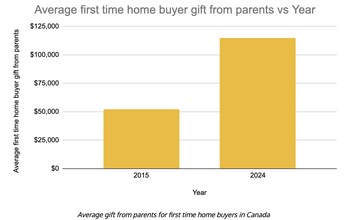In Canada's high-priced housing market, more millennials are turning to their boomer parents for financial help with down payments on first homes. A CIBC report reveals that 31% of first-time homebuyers receive parental support, a 50% increase from a decade ago, with gifts averaging $115,000—up from $52,000 in 2015. The largest gifts are in expensive markets like British Columbia ($204,000) and Ontario ($128,000). To protect their contributions, parents are increasingly requesting legal agreements like cohabitation or prenuptial contracts. These agreements secure the gifted funds if a relationship dissolves, but they can strain relationships as couples navigate financial transparency and legal considerations. Nonetheless, experts advise that open, collaborative discussions can ease tensions, balancing parental generosity with financial security for all parties involved.
TORONTO, Nov. 5, 2024 /PRNewswire-PRWeb/ -- In Canada's challenging housing market, many millennials find themselves turning to the Bank of Mom and Dad for assistance with down payments on their first homes. Parental financial support has seen a significant rise, with reports indicating that more parents are stepping in to help their children overcome the hurdle of hefty down payments.
However, this generosity often comes with conditions that could have lasting implications on their children's relationships and financial futures.
The Rise of Parental Down Payment Gifts
Millennials are turning to their boomer parents for help at unprecedented rates. In fact, a 2024 found that 31% of first-time homebuyers relied on parental gifts to fund their down payments which presents a 50% increase from only a decade ago, when parental contributions were less common. Not only is the number of parents helping out growing but so has the size of these gifts.
On average, Canadian parents are now gifting around $115,000 to help their children with a down payment . Compared to in 2015, when the average gift was closer to $52,000.
a mortgage broker for Centum Home Lenders commented, "In the past 2 years I've seen more first time home buyers than ever that get a cash gift from their parents to buy a home. Home prices are just so high that many Canadians cannot get into the market without this help."
Which Province Gives The Most To Their Children?
The amount of money parents gift varies significantly across provinces, largely reflecting how unaffordable the local real estate markets are.
- Ontario: Homebuyers in Ontario are receiving some of the largest contributions from their parents, with the average gift amount hovering around $128,000 . This reflects the province's home prices, especially in major markets like Toronto.
- British Columbia: Millennials in British Columbia are also benefiting from substantial parental gifts. Getting the more than any other province with the average amount parents are providing here is around $204,000, a figure largely driven by the expensive Vancouver housing market.
Strings Attached: The Requirement of Legal Agreements
While parents are eager to help, many are also cautious about protecting their contributions. As a result, a growing number of parents are making their financial gifts contingent upon their children entering into cohabitation agreements or prenuptial agreements with their partners. These legal documents are designed to safeguard the gifted funds in the event of a relationship breakdown.
: For unmarried couples living together, cohabitation agreements outline the division of assets and financial responsibilities. They can specify how a gifted down payment would be handled if the couple separates.
: For those planning to marry, prenuptial agreements serve a similar purpose, detailing the distribution of assets, including gifted money, should the marriage end in divorce. Without a prenup, the spouse would be entitled to half of the value of the home no matter where the funds came from or when the home was purchased.
that search volume for cohabitation agreements is up 180% from just 5 years ago.
Why Are Parents Taking This Step?
Parents are motivated by a desire to protect their financial contributions. They may be concerned about the potential loss of significant sums of living inheritance if their child's relationship ends unfavourably. By requiring these legal agreements, they aim to ensure that the gifted money remains with their child or is returned to them.
Hilary Angrove, Lawyer at commented "Due to the cost of housing in Canada, first time home buyers are stretched to the max. Saving money and selling all of their investments is not enough for a downpayment. Because of this, most parents and their children are using all of their wealth to buy real estate. Demand for domestic contracts is skyrocketing. In order to protect their assets, cohabitation agreements and prenups are no longer just for second marriages or the ultra wealthy."
Implications for Couples
While these agreements can provide financial security, they may also introduce tension within relationships. Discussions about legal contracts before moving in together or getting married can be uncomfortable and may raise trust issues between partners.
- Financial Transparency: To get an agreement, couples are required to engage in open conversations about finances, assets, and expectations in light of separation.
- Legal Considerations: It's encouraged for both parties to seek independent legal advice to fully understand the terms and implications before entering into any agreement.
Balancing Generosity and Protection
Parents and their children must navigate the delicate balance between generosity and protection. While couples relationships are being tested by the demands of the parents providing the downpayment.
- For Parents: Clearly express your intentions and concerns. Understand that while you are protecting your investment, the approach can affect your child's relationship.
- For Children: Recognize your parents' desire to safeguard their contribution. Discuss the implications with your partner to reach a mutual understanding.
Luckily, these legal agreements do not need to be controversial. If couples come into the process having already discussed their expectations, this can be a very seamless and collaborative process.
Sources:
This report is issued and approved for distribution by Angrove Law, a member of the Law Society of Ontario. Hilary Angrove is a member of the Law Society of Ontario, Law Society Number 91193V Lawyer (L1). This report is provided for informational purposes only.
Before making any investment or legal decisions on the basis of any information contained in this report, the recipient should consider whether such information is appropriate given the recipient's particular circumstances and should always consult with a lawyer or certified financial advisor.
The information and statistical data container herein were obtained from sources that we believe to be reliable, but we do not represent that they are accurate or complete, and they should not be relied upon as such. All estimates and opinions expressed herein constitute judgments as of the date of this report and are subject to change without notice. This report may provide or contain hyperlinks to internet websites, Angrove Law takes no responsibility for the contents thereof. Each hyperlink is provided solely for the recipient's convenience and information.
The Angrove Law logo are trademarks of Angrove Law, and are permitted for use and distribution.
Media Contact
Ashley MacInnis, amPR inc., Angrove Law, 1 9022209727, [email protected],
SOURCE Angrove Law







Share this article